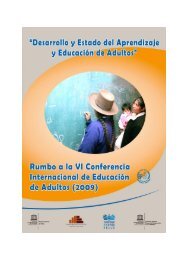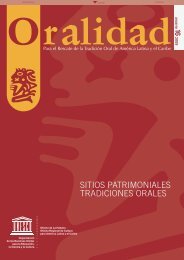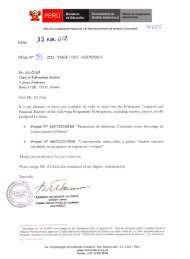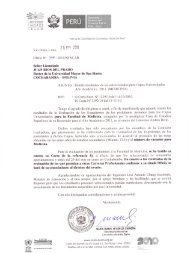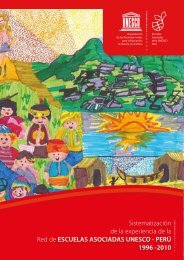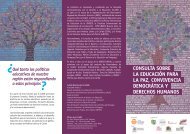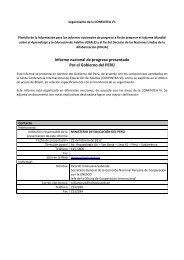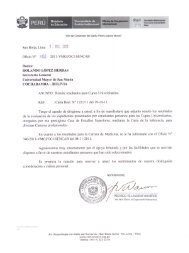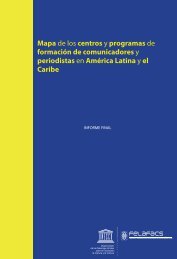100ANNEX2Education for All Global Monitoring ReportKelleher, F. (ed.). 2008. Primary School Teacher Deployment. A Comparative Study. London, Commonwealth Secretariat.Kemple, J. J. and Willner, C. J. 2008. Career Academies. Long-Term Impacts on Labor Market Outcomes, EducationalAttainment, and Transitions to Adulthood. New York, MDRC.Kendall, L., O’Donnell, L., Golden, S., Ridley, K., Machin, S., Rutt, S., McNally, S., Schagen, I., Meghir, C., Stoney, S., Morris,M., West, A. and Noden, P. 2005. Excellence in Cities; The National Evaluation of a Policy to Raise Standards in UrbanSchools 2000–2003. London, Department for Children, Schools and Families. (Research Report.)Khan, M. S. H. and Chakraborty, N. 2008. Rapid assessment of <strong>the</strong> BEHTRUWC project on completion of 1st learningcycle. Dhaka, Associates for Community and Population Research.Khan, N. C., Hop, L. T., Tuyen, L. D., Khoi, H. H., Son, T. H., Duong, P. H. and Vietnam Huynh Nam Phuong NationalInstitute of Nutrition. 2008. A national Plan of Action to accelerate stunting reduction in Vietnam. SCN News –Accelerating <strong>the</strong> Reduction of Maternal and Child Undernutrition, No. 36, pp. 30–8.Khandker, S. R., Pitt, M. M. and Fuwa, N. 2003. Subsidy to Promote Girls' Secondary Education: The Female StipendProgram in Bangladesh. Washington, DC, World Bank.King, E. M. and van de Walle, D. 2007. Girls in Lao PDR: Ethnic affiliation, poverty, and location. Lewis, M. and Lockheed,M. (eds), Exclusion, Gender and Education: Case Studies from <strong>the</strong> Developing World. Washington, DC, Center forGlobal Development, pp. 31-70.King, K. and Palmer, R. 2008. Skills for Work, Growth and Poverty Reduction. Challenges and Opportunities in <strong>the</strong> GlobalAnalysis and Monitoring of Skills. London, British Council/UK National Commission for UNESCO. (Briefing note for UKInstitute of Education Seminar, 31 October.)King, K. and Rose, P. 2005. International development targets and education: towards a new international compactor a new conditionality? Journal of International Development, Vol. 17, No. 1, pp. 97–100.Kinsella, K. and He, W. 2009. An Ageing World: 2008. Washington, DC, US Department of Health and Human Services,National Institutes of Health, National Institute on Aging/US Department of Commerce, Economics and StatisticsAdministration, US Census Bureau. (International Population Reports, P95/09-1.)Kinst, J. 2009. Introduction to <strong>the</strong> Special Report 10/2008: “EC Development Assistance to Health Services in sub-SaharanAfrica”. Brussels, Europa, press releases RAPID.http://europa.eu/rapid/pressReleasesAction.do?reference=ECA/09/5&format=HTML&aged=0&language=EN&guiLanguage=en (Accessed 31 August 2009.)Klasen, S. 2001. Social exclusion, children, and education: implications of a rights-based approach. European Societies,Vol. 3, No. 4, pp. 413–45.Klein, H. 2003. A concise history of Bolivia. Cambridge University Press.Kobiané, J.-F. and Bougma, M. 2009. Burkina Faso. RGPH 2006. Rapport d’Analyse du Thème IV. Instruction,Alphabétisation et Scolarisation [Analytical Report on Theme IV: Teaching, Literacy Training and Schooling].Ouagadougou, Institut National de la Statistique et de la Démographie.Kok, W. 2004. Facing <strong>the</strong> Challenge. The Lisbon Strategy for Growth and Employment. Luxembourg, EuropeanCommission.Krätli, S. 2006. Cultural roots of poverty? Education and pastoral livelihood in Turkana and Karamoja. Dyer, C. (ed.),The Education of Nomadic Peoples: Current Issues, Future Prospects. New York, Berghahn Books, pp. 120–40.Kristjansson, B., Robinson, V., Petticrew, M., MacDonald, B., Krasevec, J., Janzen, L., Greenhalgh, T., Wells, G. A.,MacGowan, J., Farmer, A. P., Shea, B. J., Mayhew, A. and Tugwell, P. 2007. School Feeding for Improving <strong>the</strong> Physicaland Psychosocial Health of Disadvantaged Elementary School Children (Campbell Review). Copenhagen, SFICampbell. (Campbell Systematic Reviews.)Kritzer, H. 2002. Legal systems of <strong>the</strong> world: a political, social and cultural encyclopaedia. Santa Barbara, Calif.,ABC-CLIO.Kuczera, M. S., Field, N. H. and Wolter, S. 2008. Learning for Jobs: OECD Reviews of Vocational Education and Training.Sweden. Paris, Organisation for Economic Co-operation and Development.Kudo, I. and Bazan, J. 2009. Measuring Beginner Reading Skills. An Empirical Evaluation of Alternative Instrumentsand <strong>the</strong>ir Potential Use for Policymaking and Accountability in Peru. Washington, DC, World Bank. (Policy ResearchWorking Papers, 4812.)Ky, A. 2009. Rapport d'Evaluation à Mi-Parcours de la Seconde Phase du Programme d'Invesstissement dans le Secteurde l'Education (PISE II) et de l'Initiative Fast Track [Mid-Term Evaluation Report on <strong>the</strong> Second Phase of <strong>the</strong>Investment Programme for <strong>the</strong> Education Sector (PISE II) and <strong>the</strong> Fast Track Initiative].Lall, S. 2001. Competiveness, Technology and Skills. Cheltenham, UK/Northampton, Mass., Edward Elgar Publishing Ltd.Lang, R. and Murangira, A. 2009. Disability Scoping Study: Final Report. Kampala, DFID Uganda.466
BIBLIOGRAPHYLarrañaga, O. 2009. Inequality, Poverty and Social Policy: Recent Trends in Chile. Paris, Organisation for EconomicCo-operation and Development. (OECD Social, Employment and Migration Working Papers, 85.)Larrea, C. and Montenegro Torres, F. 2006. Ecuador. Hall, G. and Patrinos, H. A. (eds), Indigenous Peoples, Povertyand Human Development in Latin America. New York, Palgrave Macmillan, pp. 67–105.Lasida, J. and Rodriguez, E. 2006. Entering <strong>the</strong> World of Work: Results from Six Entra 21 Youth Employment Projects.Baltimore, Md, International Youth Foundation. (Learning Series, 2.)Latin American and <strong>the</strong> Caribbean Demographic Center. 2009. Bi-Literacy Regional Programs: Long-Term Objective.Santiago, Economic Commission for Latin America and <strong>the</strong> Caribbean, Latin American and <strong>the</strong> CaribbeanDemographic Center, Population Division. http://www.eclac.cl/cgi-bin/getprod.asp?xml=/bialfa/noticias/paginas/7/11507/P11507.xml&xsl=/bialfa/tpl/p18f.xsl&base=/bialfa/tpl-i/top-bottom.xsl (Accessed 10 February 2009.)Lauglo, J. and Maclean, R. 2005. Vocationalisation of Secondary Education Revisited. (Technical and Vocational Educationand Training: Issues, Concerns and Prospects, Vol. 1.) Dordrecht, The Ne<strong>the</strong>rlands, Springer.Law, S. S. 2008. Vocational technical education and economic development – <strong>the</strong> Singapore Experience. Towards a BetterFuture: Education and Training for Economic Development in Singapore Since 1965. Washington, DC, World Bank.Lawn, J. E., Zupan, J., Begkoyian, G. and Knippenberg, R. 2006. Newborn survival. Jamison, D. T., Breman, J. G.,Measham, A. R., Alleyne, G., Claeson, M., Evans, D. B., Jha, P., Mills, A. and Musgrove, P. (eds), Disease ControlPriorities in Developing Countries. New York, Oxford University Press, pp. 531–49.Lawson, P. 2004. The Top 10 Problems Faced by CCMs. Paper presented at <strong>the</strong> Global Fund: How CCMs can be MoreEffective, Satellite Meeting, Bangkok AIDS 2004, 14 July.Lee, C. J. 2008. Education in <strong>the</strong> Republic of Korea: approaches, achievements, and current challenges. Tan, J.-P. andFredriksen, B. (eds), An African Exploration of <strong>the</strong> East Asian Education Experience. Washington, DC, World Bank,pp. 155–217.Lehman, D. C., Buys, P., Atchina, G. F. and Laroche, L. 2007. Shortening <strong>the</strong> Distance to Education for All in <strong>the</strong> AfricanSahel. Washington, DC, World Bank.Leitch Review of Skills. 2006. Prosperity for All in <strong>the</strong> Global Economy – World Class Skills. Final Report.Norwich, UK, UK Treasury.Leseman, P. P. M. 2002. Early Childhood Education and Care for Children from Low-income or Minority Backgrounds.OECD Oslo Workshop, Paris, Organisation for Economic Co-operation and Development, 6–7June 2002.Leseman, P. P. M. and van Tuijil, C. 2005. Cultural diversity in early literacy: findings in Dutch studies. Neuman, S. B.and Dickinson, D. K. (eds), Handbook of Early Literacy Research, Vol. 2. New York, The Guilford Press, pp. 211–28.Leu, E. 2004. The Patterns and Purposes of School-based and Cluster Teacher Professional Development Programs.Washington, DC, USAID, EQUIP1. (Study of School-based Teacher Inservice Programs and Clustering of Schools,Working Paper 2.)Levine, R., Lloyd, C., Greene, M. and Grown, C. 2008. Girls Count: A Global Investment & Action Agenda. Washington, DC,Center for Global Development.Lewin, K. M. and Stuart, J. S. 2003. Researching Teacher Education: New Perspectives on Practice, Performance andPolicy. Multi-Site Teacher Education Research Project (MUSTER). Syn<strong>the</strong>sis Report. London, UK Department forInternational Development. (Researching <strong>the</strong> Issues, 49a.)Lewis, I. 2009. Education for Disabled People in Ethiopia and Rwanda. Background paper for <strong>EFA</strong> Global MonitoringReport <strong>2010</strong>.Lewis, M. and Lockheed, M. (eds). 2007. Exclusion, Gender and Schooling: Case Studies from <strong>the</strong> Developing World.Washington, DC, Center for Global Development.Liang, Z., Guo, L. and Duan, C. C. 2008. Migration and <strong>the</strong> well-being of children in China. Yale China Health Journal,No. 5, pp. 25–46.Liberia Ministry of Education. 2007a. Appraisal and Endorsement of <strong>the</strong> Liberian Primary Education Recovery Program,Prepared for Fast Track Initiative. Monrovia, Ministry of Education.___. 2007b. Liberian Primary Education Recovery Program, Prepared for Fast Track Initiative. Monrovia, Ministryof Education.Light, D., Method, F., Rockman, C., Cressman, G. M. and Daly, J. 2008. Evaluation of <strong>the</strong> Jordan Education Initiative.Syn<strong>the</strong>sis Report. Overview and Recommendations to <strong>the</strong> Jordan Education Initiative. Washington, DC, EducationDevelopment Center.Liimatainen, M.-R. 2002. Training and Skills Acquisition in <strong>the</strong> Informal Sector: A Literature Review. Geneva, Switzerland,International Labour Organization. (Informal Economy Series. Working paper.)467
- Page 9 and 10:
CONTENTSChapter 4The aid compact: f
- Page 12 and 13:
100CONTENTS2Education for All Globa
- Page 15 and 16:
HIGHLIGHTS OF THE EFA REPORT 2010Hi
- Page 17 and 18:
OVERVIEW© XINHUA/Gamma/Eyedea Pres
- Page 19 and 20:
OVERVIEWChapter 2Monitoring progres
- Page 21 and 22:
OVERVIEWis open to question. Many n
- Page 23 and 24:
OVERVIEWon the scale of marginaliza
- Page 25 and 26:
OVERVIEWhome from the language of i
- Page 27 and 28:
OVERVIEW© Crispin Hughes/PANOSthe
- Page 29 and 30:
OVERVIEWThe reform process starts b
- Page 31 and 32:
Education for All Global Monitoring
- Page 33 and 34:
EDUCATION AT RISK: THE IMPACT OF TH
- Page 35 and 36:
EDUCATION AT RISK: THE IMPACT OF TH
- Page 37 and 38:
EDUCATION AT RISK: THE IMPACT OF TH
- Page 39 and 40:
EDUCATION AT RISK: THE IMPACT OF TH
- Page 41 and 42:
EDUCATION AT RISK: THE IMPACT OF TH
- Page 43 and 44:
EDUCATION AT RISK: THE IMPACT OF TH
- Page 45 and 46:
EDUCATION AT RISK: THE IMPACT OF TH
- Page 47 and 48:
EDUCATION AT RISK: THE IMPACT OF TH
- Page 49 and 50:
EDUCATION AT RISK: THE IMPACT OF TH
- Page 51 and 52:
EDUCATION AT RISK: THE IMPACT OF TH
- Page 53 and 54:
Education for All Global Monitoring
- Page 55 and 56:
PROGRESS TOWARDS THE EFA GOALSIntro
- Page 57 and 58:
PROGRESS TOWARDS THE EFA GOALSEarly
- Page 59 and 60:
PROGRESS TOWARDS THE EFA GOALSEarly
- Page 61 and 62:
PROGRESS TOWARDS THE EFA GOALSEarly
- Page 63 and 64:
PROGRESS TOWARDS THE EFA GOALSEarly
- Page 65 and 66:
PROGRESS TOWARDS THE EFA GOALSEarly
- Page 67 and 68:
PROGRESS TOWARDS THE EFA GOALSEarly
- Page 69 and 70:
PROGRESS TOWARDS THE EFA GOALSUnive
- Page 71 and 72:
PROGRESS TOWARDS THE EFA GOALSUnive
- Page 73 and 74:
PROGRESS TOWARDS THE EFA GOALSUnive
- Page 75 and 76:
PROGRESS TOWARDS THE EFA GOALSUnive
- Page 77 and 78:
PROGRESS TOWARDS THE EFA GOALSUnive
- Page 79 and 80:
PROGRESS TOWARDS THE EFA GOALSUnive
- Page 81 and 82:
PROGRESS TOWARDS THE EFA GOALSUnive
- Page 83 and 84:
PROGRESS TOWARDS THE EFA GOALSUnive
- Page 85 and 86:
PROGRESS TOWARDS THE EFA GOALSUnive
- Page 87 and 88:
PROGRESS TOWARDS THE EFA GOALSUnive
- Page 89 and 90:
PROGRESS TOWARDS THE EFA GOALSUnive
- Page 91 and 92:
PROGRESS TOWARDS THE EFA GOALSYouth
- Page 93 and 94:
PROGRESS TOWARDS THE EFA GOALSYouth
- Page 95 and 96:
PROGRESS TOWARDS THE EFA GOALSYouth
- Page 97 and 98:
PROGRESS TOWARDS THE EFA GOALSYouth
- Page 99 and 100:
PROGRESS TOWARDS THE EFA GOALSYouth
- Page 101 and 102:
PROGRESS TOWARDS THE EFA GOALSYouth
- Page 103 and 104:
PROGRESS TOWARDS THE EFA GOALSYouth
- Page 105 and 106:
PROGRESS TOWARDS THE EFA GOALSYouth
- Page 107 and 108:
PROGRESS TOWARDS THE EFA GOALSYouth
- Page 109 and 110:
PROGRESS TOWARDS THE EFA GOALSYouth
- Page 111 and 112:
PROGRESS TOWARDS THE EFA GOALSYouth
- Page 113 and 114:
PROGRESS TOWARDS THE EFA GOALSYouth
- Page 115 and 116:
PROGRESS TOWARDS THE EFA GOALSYouth
- Page 117 and 118:
PROGRESS TOWARDS THE EFA GOALSYouth
- Page 119 and 120:
PROGRESS TOWARDS THE EFA GOALSThe q
- Page 121 and 122:
PROGRESS TOWARDS THE EFA GOALSThe q
- Page 123 and 124:
PROGRESS TOWARDS THE EFA GOALSThe q
- Page 125 and 126:
PROGRESS TOWARDS THE EFA GOALSThe q
- Page 127 and 128:
PROGRESS TOWARDS THE EFA GOALSThe q
- Page 129 and 130:
PROGRESS TOWARDS THE EFA GOALSThe q
- Page 131 and 132:
PROGRESS TOWARDS THE EFA GOALSThe q
- Page 133 and 134:
PROGRESS TOWARDS THE EFA GOALSEstim
- Page 135 and 136:
PROGRESS TOWARDS THE EFA GOALSEstim
- Page 137 and 138:
PROGRESS TOWARDS THE EFA GOALSEstim
- Page 139 and 140:
PROGRESS TOWARDS THE EFA GOALSEstim
- Page 141 and 142:
PROGRESS TOWARDS THE EFA GOALSEstim
- Page 143 and 144:
PROGRESS TOWARDS THE EFA GOALSEstim
- Page 145 and 146:
PROGRESS TOWARDS THE EFA GOALSEstim
- Page 147 and 148:
Education for All Global Monitoring
- Page 149 and 150:
REACHING THE MARGINALIZEDIntroducti
- Page 151 and 152:
REACHING THE MARGINALIZEDIntroducti
- Page 153 and 154:
REACHING THE MARGINALIZEDMeasuring
- Page 155 and 156:
REACHING THE MARGINALIZEDMeasuring
- Page 157 and 158:
REACHING THE MARGINALIZEDMeasuring
- Page 159 and 160:
REACHING THE MARGINALIZEDMeasuring
- Page 161 and 162:
REACHING THE MARGINALIZEDMeasuring
- Page 163 and 164:
REACHING THE MARGINALIZEDMeasuring
- Page 165 and 166:
REACHING THE MARGINALIZEDMeasuring
- Page 167 and 168:
REACHING THE MARGINALIZEDMeasuring
- Page 169 and 170:
REACHING THE MARGINALIZEDMeasuring
- Page 171 and 172:
REACHING THE MARGINALIZEDMeasuring
- Page 173 and 174:
REACHING THE MARGINALIZEDMeasuring
- Page 175 and 176:
REACHING THE MARGINALIZEDMeasuring
- Page 177 and 178:
REACHING THE MARGINALIZEDMeasuring
- Page 179 and 180:
REACHING THE MARGINALIZEDGetting le
- Page 181 and 182:
REACHING THE MARGINALIZEDGetting le
- Page 183 and 184:
REACHING THE MARGINALIZEDGetting le
- Page 185 and 186:
REACHING THE MARGINALIZEDGetting le
- Page 187 and 188:
REACHING THE MARGINALIZEDGetting le
- Page 189 and 190:
REACHING THE MARGINALIZEDGetting le
- Page 191 and 192:
REACHING THE MARGINALIZEDGetting le
- Page 193 and 194:
REACHING THE MARGINALIZEDGetting le
- Page 195 and 196:
REACHING THE MARGINALIZEDGetting le
- Page 197 and 198:
REACHING THE MARGINALIZEDGetting le
- Page 199 and 200:
REACHING THE MARGINALIZEDGetting le
- Page 201 and 202:
REACHING THE MARGINALIZEDLevelling
- Page 203 and 204:
REACHING THE MARGINALIZEDLevelling
- Page 205 and 206:
REACHING THE MARGINALIZEDLevelling
- Page 207 and 208:
REACHING THE MARGINALIZEDLevelling
- Page 209 and 210:
REACHING THE MARGINALIZEDLevelling
- Page 211 and 212:
REACHING THE MARGINALIZEDLevelling
- Page 213 and 214:
REACHING THE MARGINALIZEDLevelling
- Page 215 and 216:
REACHING THE MARGINALIZEDLevelling
- Page 217 and 218:
REACHING THE MARGINALIZEDLevelling
- Page 219 and 220:
REACHING THE MARGINALIZEDLevelling
- Page 221 and 222:
REACHING THE MARGINALIZEDLevelling
- Page 223 and 224:
REACHING THE MARGINALIZEDLevelling
- Page 225 and 226:
REACHING THE MARGINALIZEDLevelling
- Page 227 and 228:
REACHING THE MARGINALIZEDLevelling
- Page 229 and 230:
Education for All Global Monitoring
- Page 231 and 232:
THE AID COMPACT: FALLING SHORT OF C
- Page 233 and 234:
THE AID COMPACT: FALLING SHORT OF C
- Page 235 and 236:
THE AID COMPACT: FALLING SHORT OF C
- Page 237 and 238:
THE AID COMPACT: FALLING SHORT OF C
- Page 239 and 240:
THE AID COMPACT: FALLING SHORT OF C
- Page 241 and 242:
THE AID COMPACT: FALLING SHORT OF C
- Page 243 and 244:
THE AID COMPACT: FALLING SHORT OF C
- Page 245 and 246:
THE AID COMPACT: FALLING SHORT OF C
- Page 247 and 248:
THE AID COMPACT: FALLING SHORT OF C
- Page 249 and 250:
THE AID COMPACT: FALLING SHORT OF C
- Page 251 and 252:
THE AID COMPACT: FALLING SHORT OF C
- Page 253 and 254:
THE AID COMPACT: FALLING SHORT OF C
- Page 255 and 256:
THE AID COMPACT: FALLING SHORT OF C
- Page 257 and 258:
THE AID COMPACT: FALLING SHORT OF C
- Page 259 and 260:
THE AID COMPACT: FALLING SHORT OF C
- Page 261 and 262:
THE AID COMPACT: FALLING SHORT OF C
- Page 263 and 264:
THE AID COMPACT: FALLING SHORT OF C
- Page 265 and 266:
THE AID COMPACT: FALLING SHORT OF C
- Page 267 and 268:
THE AID COMPACT: FALLING SHORT OF C
- Page 269 and 270:
THE AID COMPACT: FALLING SHORT OF C
- Page 271 and 272:
THE AID COMPACT: FALLING SHORT OF C
- Page 273 and 274:
THE AID COMPACT: FALLING SHORT OF C
- Page 275 and 276:
THE AID COMPACT: FALLING SHORT OF C
- Page 277 and 278:
THE AID COMPACT: FALLING SHORT OF C
- Page 279 and 280:
THE AID COMPACT: FALLING SHORT OF C
- Page 281 and 282:
THE AID COMPACT: FALLING SHORT OF C
- Page 283 and 284:
Education for All Global Monitoring
- Page 285 and 286:
RISING TO THE EFA CHALLENGEOvercomi
- Page 287 and 288:
RISING TO THE EFA CHALLENGEOvercomi
- Page 289 and 290:
RISING TO THE EFA CHALLENGEOvercomi
- Page 291 and 292:
Education for All Global Monitoring
- Page 293 and 294:
THE EDUCATION FOR ALL DEVELOPMENT I
- Page 295 and 296:
THE EDUCATION FOR ALL DEVELOPMENT I
- Page 297 and 298:
THE EDUCATION FOR ALL DEVELOPMENT I
- Page 299 and 300:
THE EDUCATION FOR ALL DEVELOPMENT I
- Page 301 and 302:
THE EDUCATION FOR ALL DEVELOPMENT I
- Page 303 and 304:
THE EDUCATION FOR ALL DEVELOPMENT I
- Page 305 and 306:
THE EDUCATION FOR ALL DEVELOPMENT I
- Page 307 and 308:
SELECTED INTERNATIONAL HUMAN RIGHTS
- Page 309 and 310:
EDUCATIONAL EFFECT OF SELECTED SOCI
- Page 311 and 312:
STATISTICAL TABLESIntroductionunder
- Page 313 and 314:
STATISTICAL TABLESIntroductionLithu
- Page 315 and 316:
STATISTICAL TABLESTable 1CurrentUS$
- Page 317 and 318:
STATISTICAL TABLESTable 1CurrentUS$
- Page 319 and 320:
STATISTICAL TABLESTable 1CurrentUS$
- Page 321 and 322:
STATISTICAL TABLESTable 1CurrentUS$
- Page 323 and 324:
STATISTICAL TABLESTable 2YOUTH LITE
- Page 325 and 326:
STATISTICAL TABLESTable 2YOUTH LITE
- Page 327 and 328:
STATISTICAL TABLESTable 2YOUTH LITE
- Page 329 and 330:
STATISTICAL TABLESTable 2YOUTH LITE
- Page 331 and 332:
STATISTICAL TABLESTable 3ACHILD WEL
- Page 333 and 334:
STATISTICAL TABLESTable 3ATuberculo
- Page 335 and 336:
STATISTICAL TABLESTable 3ACHILD WEL
- Page 337 and 338:
STATISTICAL TABLESTable 3ATuberculo
- Page 339 and 340:
STATISTICAL TABLESTable 3BGROSS ENR
- Page 341:
STATISTICAL TABLESTable 3BGROSS ENR
- Page 344 and 345:
01ANNEX02Education for All Global M
- Page 346 and 347:
01ANNEX02Education for All Global M
- Page 348 and 349:
01ANNEX02Education for All Global M
- Page 350 and 351:
01ANNEX02Education for All Global M
- Page 352 and 353:
01ANNEX02Education for All Global M
- Page 354 and 355:
0102ANNEXTable 5Participation in pr
- Page 356 and 357:
10ANNEX02Education for All Global M
- Page 358 and 359:
01ANNEX02Education for All Global M
- Page 360 and 361:
01ANNEX02Education for All Global M
- Page 362 and 363:
01ANNEX02Education for All Global M
- Page 364 and 365:
01ANNEX02Education for All Global M
- Page 366 and 367:
01ANNEX02Education for All Global M
- Page 368 and 369:
01ANNEX02Education for All Global M
- Page 370 and 371:
1002ANNEXTable 7Internal efficiency
- Page 372 and 373:
01ANNEX02Table 7 (continued)DROPOUT
- Page 374 and 375:
01ANNEX02Table 7 (continued)DROPOUT
- Page 376 and 377:
01ANNEX02Table 7 (continued)DROPOUT
- Page 378 and 379:
01ANNEX02Education for All Global M
- Page 380 and 381:
01ANNEX02Education for All Global M
- Page 382 and 383:
01ANNEX02Education for All Global M
- Page 384 and 385:
01ANNEX02Education for All Global M
- Page 386 and 387:
01ANNEX02Education for All Global M
- Page 388 and 389:
01ANNEX02Education for All Global M
- Page 390 and 391:
01ANNEX02Education for All Global M
- Page 392 and 393:
10ANNEX02Education for All Global M
- Page 394 and 395:
01ANNEX02Table 9B. Tertiary educati
- Page 396 and 397:
01ANNEX02Education for All Global M
- Page 398 and 399:
01ANNEX02Table 9B (continued)PERCEN
- Page 400 and 401:
01ANNEX02Education for All Global M
- Page 402 and 403:
01ANNEX02Education for All Global M
- Page 404 and 405:
01ANNEX02Education for All Global M
- Page 406 and 407:
01ANNEX02Education for All Global M
- Page 408 and 409:
01ANNEX02Education for All Global M
- Page 410 and 411:
01ANNEX02Education for All Global M
- Page 412 and 413:
01ANNEX02Education for All Global M
- Page 414 and 415:
01ANNEX02Education for All Global M
- Page 416 and 417:
01ANNEX02Education for All Global M
- Page 418 and 419:
01ANNEX02Education for All Global M
- Page 420 and 421:
10ANNEX02Education for All Global M
- Page 422 and 423:
01ANNEX02Education for All Global M
- Page 424 and 425:
01ANNEX02Education for All Global M
- Page 426 and 427:
1020ANNEXTable 12Trends in basic or
- Page 428 and 429:
2 0 10Education for All Global Moni
- Page 430 and 431: 01ANNEX02Education for All Global M
- Page 432 and 433: 01ANNEX02Education for All Global M
- Page 434 and 435: 01ANNEX02Education for All Global M
- Page 436 and 437: 01ANNEX02Education for All Global M
- Page 438 and 439: 01ANNEX02Education for All Global M
- Page 440 and 441: 01ANNEX02Education for All Global M
- Page 442 and 443: 20Education for All Global Monitori
- Page 444 and 445: 0120ANNEXEducation for All Global M
- Page 446 and 447: 001ANNEX2Education for All Global M
- Page 448 and 449: 100ANNEX2Education for All Global M
- Page 450 and 451: 100ANNEX2Education for All Global M
- Page 452 and 453: 010ANNEX2Education for All Global M
- Page 454 and 455: 0120ANNEXEducation for All Global M
- Page 456 and 457: 010ANNEX2Education for All Global M
- Page 458 and 459: 01ANNEX02Education for All Global M
- Page 460 and 461: 2 0 10Education for All Global Moni
- Page 462 and 463: 0120ANNEXEducation for All Global M
- Page 464 and 465: 010ANNEX2Education for All Global M
- Page 466 and 467: 100ANNEX2Education for All Global M
- Page 468 and 469: 100ANNEX2Education for All Global M
- Page 470 and 471: 100ANNEX2Education for All Global M
- Page 472 and 473: 100ANNEX2Education for All Global M
- Page 474 and 475: 100ANNEX2Education for All Global M
- Page 476 and 477: 100ANNEX2Education for All Global M
- Page 478 and 479: 100ANNEX2Education for All Global M
- Page 482 and 483: 100ANNEX2Education for All Global M
- Page 484 and 485: 100ANNEX2Education for All Global M
- Page 486 and 487: 010ANNEX2Education for All Global M
- Page 488 and 489: 100ANNEX2Education for All Global M
- Page 490 and 491: 100ANNEX2Education for All Global M
- Page 492 and 493: 010ANNEX2Education for All Global M
- Page 494 and 495: 010ANNEX2Education for All Global M
- Page 496 and 497: 100ANNEX2Education for All Global M
- Page 498 and 499: 100ANNEX2Education for All Global M
- Page 500 and 501: 12 00ANNEXEducation for All Global
- Page 502 and 503: 0120ANNEXEducation for All Global M
- Page 504 and 505: 0120ANNEXEducation for All Global M
- Page 506 and 507: 0120ANNEXEducation for All Global M
- Page 508 and 509: 0120ANNEXEducation for All Global M
- Page 510 and 511: 0120ANNEXEducation for All Global M
- Page 512 and 513: 0120ANNEXEducation for All Global M
- Page 514 and 515: 0120ANNEXEducation for All Global M
- Page 516 and 517: 0120ANNEXEducation for All Global M
- Page 518 and 519: 0120ANNEXEducation for All Global M
- Page 520 and 521: 0120ANNEXEducation for All Global M
- Page 522 and 523: 0120ANNEXEducation for All Global M
- Page 524 and 525: 0120ANNEXEducation for All Global M



